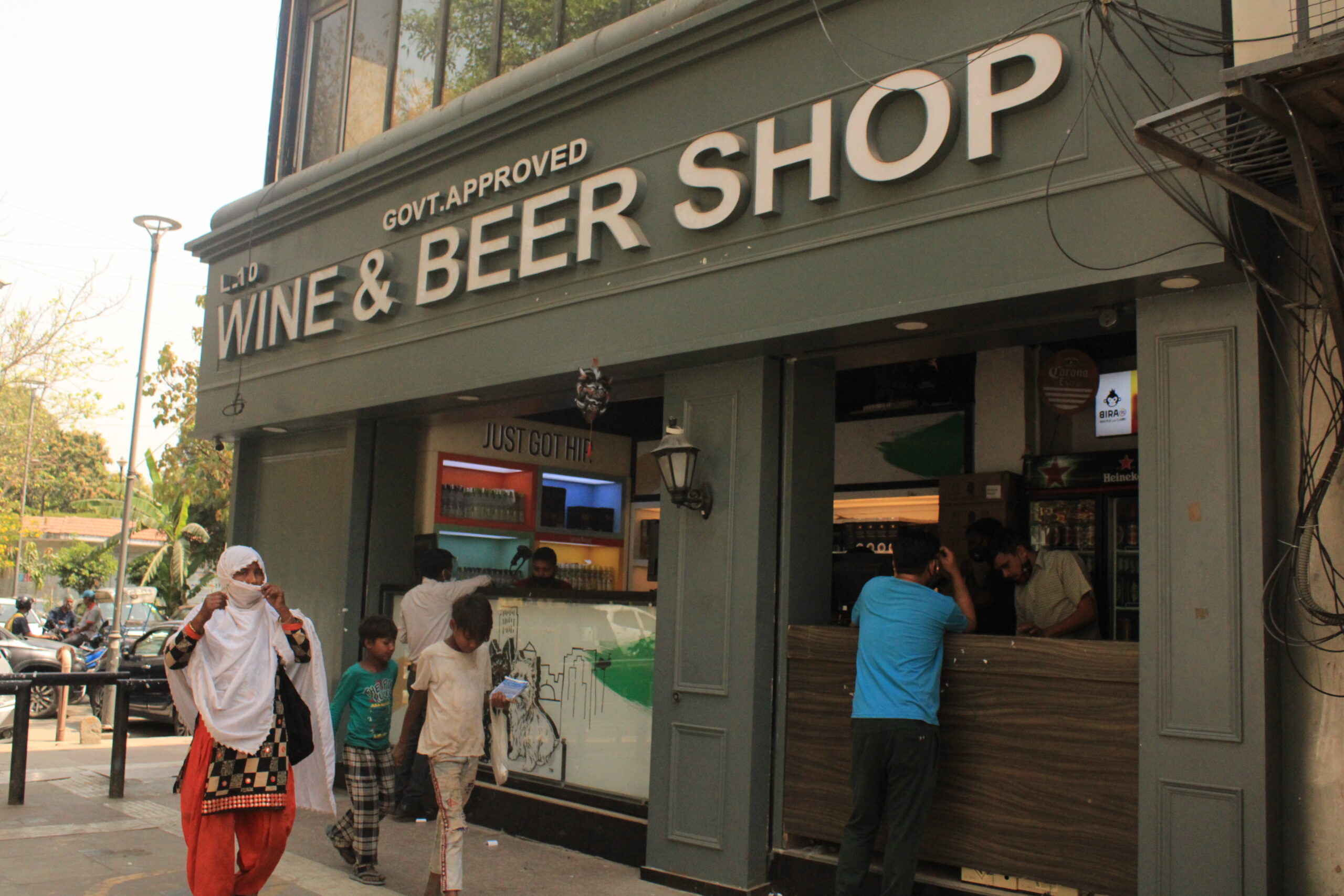
A govt. liquor store with an attached walk-in facility in South Delhi's New Friends colony. Photo: Shruty Yadav
One, there will be fewer dry days. Only three have been notified for the year, although some more can be declared if the need arises. One is already past: Republic Day. The other two, predictably, are 15 August and 2 October.
Two, there will be more liquor vends – 850 instead of 720 – all of them in the private sector. Of the 32 zones into which the city is divided, each zone comprising 8-10 wards has been allowed around 27 vends.
Three, the new policy has also paved the way for swanky liquor shops where customers can walk in and pick the brands of their choice.
A fourth facility that social drinkers, as well as regulars, are hoping for is home delivery of liquor, already underway in other cities. However, Delhi Government has not decided on this as scams have surfaced in the online payment system in Noida.
The private vends arrived with a bang in February, when long queues were spotted winding through markets. They were offering lucrative offers like a 30% discount and buy-one-get-one-free. According to vendors, they were doing this to exhaust their stock by the end of March as licences will be renewed in the new financial year.
But soon the Excise Commissioner had to step in. “It has been brought to the notice of the excise department that as a result of discounts being offered by the licensees through their retail vends, instances were reported of large crowds gathering outside the liquor stores leading to law-and-order problems and causing inconvenience to locals”.
So why does the Delhi Government want people to drink more? It’s mostly for the purpose of garnering more revenue via excise duty, not to encourage more drinking, for which the legal age is 25 years in the capital.
The first step towards this policy was the committee formed in 2020. In this report, the committee suggested opening more liquor shops according to the proportion of the population in the city.
“At present, there are 720 active retail vends in Delhi located in Local shopping Complexes (LSCs), shopping malls and Airports. However, the population-to-vend ratio is relatively low as compared to other metro cities in India. Further, the number of retail vends is also not commensurate with the size and demand of the city as compared to other metros like Bangalore and Mumbai. The number of vends in Mumbai and Bangalore is 1190 and 1794 with a population of 1.23 crore and 1.93 crores respectively”, reads the report.
The committee also suggested facilitating the entry of new players in the business to help in securing optimum revenue for the government. In this report, It was also highlighted to bring an equitable representation of vends in the areas where there are no vends.
A retired excise officer explains, “In the mid-1970s, Delhi witnessed a hooch tragedy, which resulted in the death of hundreds of people after this incident liquor business in the capital was taken over by the government”. After 45 years, again the liquor business in the capital has gone into the hands of private players.
Soon after the implementation of this policy, BJP’s Delhi unit held demonstrations at various sites in the capital. Recently it has launched its ‘referendum’ movement to collect the opinion of 10 lakh city residents on the AAP government’s new excise policy. BJP is opposing the opening of liquor shops in residential areas, near schools and temples.
But the stakes are too high for AAP to deviate from its course. An AAP leader explained, “Delhi government is projecting Rs 10,000 crore revenue in future. Many areas where there were no liquor shops have got access to the liquor”.
Asked about BJP’s opposition, he retorted, “Earlier, their people were controlling the business but after the implementation of this policy, their cartel has broken”.
A retired employee of the Excise Department feels the old system was properly streamlined. “Earlier there was a system of checks and balances but now the whole game is in the hands of private players. In our time there was a system: from shop managers to anti-corruption sleuths to check any mismanagement in the business but now there is no mechanism to check malpractices.”
Also, “Around 194 temporary employees have lost their jobs. Many were given jobs on compassionate grounds,” adds the ex-officer.
Vinod Giri, director general of Confederation of Indian Alcoholic Beverage Companies (CIABC), while talking with Patriot, explained the current situation of the trade. “In February, when vendors were offering lucrative discounts, the response was good. But, after the excise department issued the order to cease the discounts, again sales went down”.
Last year too was not good for liquor vendors. In January-December 2021, liquor sale was down 4% whereas in 2020 sale was up 12% from 2019. “Slow rollout of the policy is one of the reasons behind our losses. Five months have passed but only around 550 shops are opened,” said Giri.
He oozes optimism about the future of the liquor business in the capital. “When the policy is fully implemented, the business will be in good flow. If administration allows us to give discounts, we can increase sales from 5-6% to more than that,” adds Giri.
For more stories that cover the ongoings of Delhi NCR, follow us on:
Instagram: https://www.instagram.com/thepatriot_in/
Twitter: https://twitter.com/Patriot_Delhi
Facebook: https://www.facebook.com/Thepatriotnewsindia
Municipal Corporation of Delhi plans a unified policy enabling RWAs to adopt and maintain parks…
A 17-year-old boy allegedly died by suicide after jumping before a moving train at Uttam…
Delhi High Court grants bail to 26-year-old Thar driver accused of mowing down two in…
Two Rohini men arrested for fatally stabbing one person and injuring another during a robbery…
Rekha Gupta marks one year in office, highlighting welfare schemes, infrastructure work, and governance reforms…
Four men, including the alleged mastermind, were arrested for luring a shopper with fake cash…